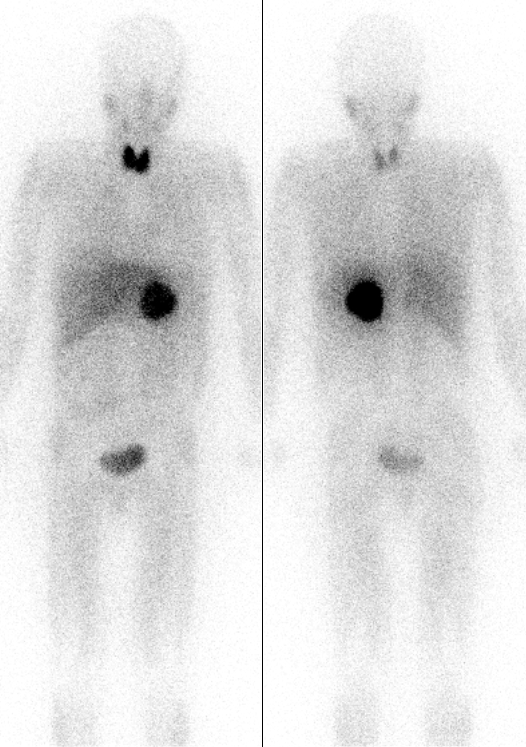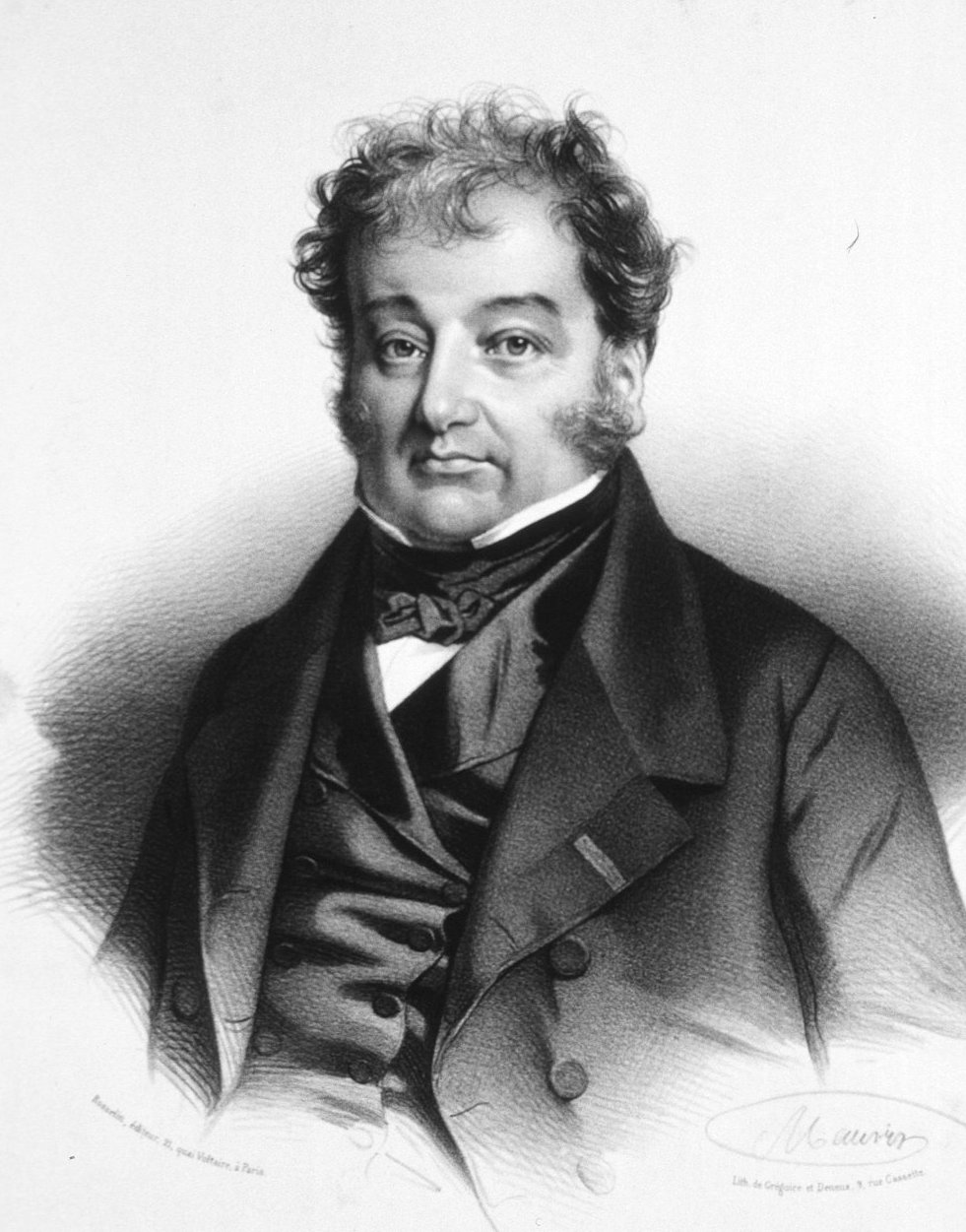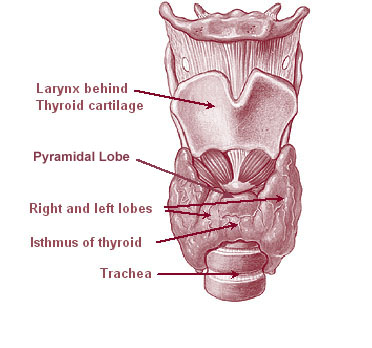|
Lugol's Iodine
Lugol's iodine, also known as aqueous iodine and strong iodine solution, is a solution of potassium iodide with iodine in water. It is a medication and disinfectant used for a number of purposes. Taken by mouth it is used to treat thyrotoxicosis until surgery can be carried out, protect the thyroid gland from radioactive iodine, and to treat iodine deficiency. When applied to the cervix it is used to help in screening for cervical cancer. As a disinfectant it may be applied to small wounds such as a needle stick injury. A small amount may also be used for emergency disinfection of drinking water. Side effects may include allergic reactions, headache, vomiting, and conjunctivitis. Long term use may result in trouble sleeping and depression. It should not typically be used during pregnancy or breastfeeding. Lugol's iodine is a liquid made up of two parts potassium iodide for every one part elemental iodine in water. Lugol's iodine was first made in 1829 by the French physi ... [...More Info...] [...Related Items...] OR: [Wikipedia] [Google] [Baidu] |
Potassium Iodide
Potassium iodide is a chemical compound, medication, and dietary supplement. It is a medication used for treating hyperthyroidism, in radiation emergencies, and for protecting the thyroid gland when certain types of radiopharmaceuticals are used. In the third world it is also used for treating skin sporotrichosis and phycomycosis. It is a supplement used by people with low dietary intake of iodine. It is administered orally. Common side effects include vomiting, diarrhea, abdominal pain, rash, and swelling of the salivary glands. Other side effects include allergic reactions, headache, goitre, and depression. While use during pregnancy may harm the baby, its use is still recommended in radiation emergencies. Potassium iodide has the chemical formula K I. Commercially it is made by mixing potassium hydroxide with iodine. Potassium iodide has been used medically since at least 1820. It is on the World Health Organization's List of Essential Medicines. Potassium iodide is ... [...More Info...] [...Related Items...] OR: [Wikipedia] [Google] [Baidu] |
Jean Guillaume Auguste Lugol
Jean Guillaume Auguste Lugol (18 August 1786 – 16 September 1851) was a French physician. Lugol was born in Montauban. He studied medicine in Paris and graduated MD in 1812. In 1819 he was appointed acting physician at the Hôpital Saint-Louis a post he held until he retired. After his death in 1851 at Neuilly-sur-Seine, his daughter Adele-Augustine, married Paul Broca. Lugol was interested in tuberculosis and presented a paper to the Royal Academy of Science in Paris in which he advocated the use of fresh air, exercise, cold bathing and drugs. He also published four books on scrofulous diseases and their treatment (1829, 1830, 1831, 1834). Members of the Royal Academy visited Lugol's hospital and, observing an improvement in his patients over the course of sixteen months, endorsed his treatment. He suggested that his iodine solution could be used to treat tuberculosis. This assertion attracted much attention at the time. Although not efficacious in treating tuberculosis, Lu ... [...More Info...] [...Related Items...] OR: [Wikipedia] [Google] [Baidu] |
Mucogingival Junction
A mucogingival junction is an anatomical feature found on the intraoral mucosa. The mucosa of the cheeks and floor of the mouth are freely moveable and fragile, whereas the mucosa around the teeth and on the palate are firm and keratinized. Where the two tissue types meet is known as a mucogingival junction. There are three mucogingival junctions: on the facial of the maxilla and on both the facial and lingual of the mandible. The palatal gingiva of the maxilla is continuous with the tissue of the palate, which is bound down to the palatal bones. Because the palate is devoid of freely moveable alveolar mucosa, there is no mucogingival junction.Carranza's Clinical Periodontology, W.B. Saunders 2002, page 17. Clinical importance The clinical importance of the mucogingival junction is in measuring the width of attached gingiva. Attached gingiva is important because it is bound very tightly to the underlying alveolar bone and provides protection to the mucosa during functional use ... [...More Info...] [...Related Items...] OR: [Wikipedia] [Google] [Baidu] |
Schiller's Test
Schiller's test or Schiller's Iodine test is a medical test in which iodine solution is applied to the cervix in order to diagnose cervical cancer. Procedure Schiller's iodine solution is applied to the cervix under direct vision. Normal cervical mucosa contains glycogen and stains brown, whereas abnormal areas, such as early cervical cancer, do not take up the stain. The abnormal areas can then be biopsied and examined histologically. The composition of Schiller's iodine is the same as Lugol's iodine, the latter being more concentrated. When Schiller's iodine is not available, Lugol's iodine can be used as an alternative. Schiller's test is not specific for cervical cancer, as areas of inflammation, ulceration and keratosis Keratosis (from '' kerat-'' + '' -osis'') is a growth of keratin on the skin or on mucous membranes stemming from keratinocytes, the prominent cell type in the epidermis. More specifically, it can refer to: * actinic keratosis (also known as solar ... ... [...More Info...] [...Related Items...] OR: [Wikipedia] [Google] [Baidu] |
Biopsy
A biopsy is a medical test commonly performed by a surgeon, interventional radiologist, or an interventional cardiologist. The process involves extraction of sample cells or tissues for examination to determine the presence or extent of a disease. The tissue is then fixed, dehydrated, embedded, sectioned, stained and mounted before it is generally examined under a microscope by a pathologist; it may also be analyzed chemically. When an entire lump or suspicious area is removed, the procedure is called an excisional biopsy. An incisional biopsy or core biopsy samples a portion of the abnormal tissue without attempting to remove the entire lesion or tumor. When a sample of tissue or fluid is removed with a needle in such a way that cells are removed without preserving the histological architecture of the tissue cells, the procedure is called a needle aspiration biopsy. Biopsies are most commonly performed for insight into possible cancerous or inflammatory conditions. H ... [...More Info...] [...Related Items...] OR: [Wikipedia] [Google] [Baidu] |
Vagina
In mammals, the vagina is the elastic, muscular part of the female genital tract. In humans, it extends from the vestibule to the cervix. The outer vaginal opening is normally partly covered by a thin layer of mucosal tissue called the hymen. At the deep end, the cervix (neck of the uterus) bulges into the vagina. The vagina allows for sexual intercourse and birth. It also channels menstrual flow, which occurs in humans and closely related primates as part of the menstrual cycle. Although research on the vagina is especially lacking for different animals, its location, structure and size are documented as varying among species. Female mammals usually have two external openings in the vulva; these are the urethral opening for the urinary tract and the vaginal opening for the genital tract. This is different from male mammals, who usually have a single urethral opening for both urination and reproduction. The vaginal opening is much larger than the nearby urethral ... [...More Info...] [...Related Items...] OR: [Wikipedia] [Google] [Baidu] |
Colposcopy
Colposcopy ( grc, κόλπος, kolpos, hollow, womb, vagina + ''skopos'' "look at") is a medical diagnostic procedure to visually examine the cervix as well as the vagina and vulva using a colposcope. The main goal of colposcopy is to prevent cervical cancer by detecting and treating precancerous lesions early. Human Papillomavirus (HPV) is a common infection and the underlying cause for most cervical cancers. Smoking also makes developing cervical abnormalities more likely. Other reasons for a patient to have a colposcopy include assessment of diethylstilbestrol (DES) exposure in utero, immunosuppression, abnormal appearance of the cervix or as a part of a sexual assault forensic examination. Colposcopy is done using a colposcope, which provides a magnified and illuminated view of the areas, allowing the colposcopist to visually distinguish normal from abnormal appearing tissue, such as damaged or abnormal changes in the tissue ( lesions), and take directed biopsies f ... [...More Info...] [...Related Items...] OR: [Wikipedia] [Google] [Baidu] |
Levothyroxine
Levothyroxine, also known as -thyroxine, is a manufactured form of the thyroid hormone thyroxine (T4). It is used to treat thyroid hormone deficiency (hypothyroidism), including a severe form known as myxedema coma. It may also be used to treat and prevent certain types of thyroid tumors. It is not indicated for weight loss. Levothyroxine is taken by mouth or given by intravenous injection. Maximum effect from a specific dose can take up to six weeks to occur. Side effects from excessive doses include weight loss, trouble tolerating heat, sweating, anxiety, trouble sleeping, tremor, and fast heart rate. Use is not recommended in people who have had a recent heart attack. Use during pregnancy has been found to be safe. Dosing should be based on regular measurements of thyroid-stimulating hormone (TSH) and T4 levels in the blood. Much of the effect of levothyroxine is following its conversion to triiodothyronine (T3). Levothyroxine was first made in 1927. It is on the World ... [...More Info...] [...Related Items...] OR: [Wikipedia] [Google] [Baidu] |
Antithyroid Agent
An antithyroid agent is a hormone antagonist acting upon thyroid hormones. The main antithyroid drugs are carbimazole (in the UK), methimazole (in the US), and propylthiouracil (PTU). A less common antithyroid agent is potassium perchlorate. Graves' disease In Graves' disease, treatment with antithyroid medications must be given for six months to two years, in order to be effective. Even then, upon cessation of the drugs, the hyperthyroid state may recur. Side effects of the antithyroid medications include a potentially fatal reduction in the level of white blood cells. A randomized control trial testing single dose treatment for Graves' found methimazole achieved euthyroid state more effectively after 12 weeks than did propylthiouracil (77.1% on methimazole 15 mg vs 19.4% in the propylthiouracil 150 mg groups). But generally both drugs are considered equivalent. A study has shown no difference in outcome for adding thyroxine to antithyroid medication and continuing t ... [...More Info...] [...Related Items...] OR: [Wikipedia] [Google] [Baidu] |
Euthyroid
The thyroid, or thyroid gland, is an endocrine gland in vertebrates. In humans it is in the neck and consists of two connected lobes. The lower two thirds of the lobes are connected by a thin band of tissue called the thyroid isthmus. The thyroid is located at the front of the neck, below the Adam's apple. Microscopically, the functional unit of the thyroid gland is the spherical thyroid follicle, lined with follicular cells (thyrocytes), and occasional parafollicular cells that surround a lumen containing colloid. The thyroid gland secretes three hormones: the two thyroid hormones triiodothyronine (T3) and thyroxine (T4)and a peptide hormone, calcitonin. The thyroid hormones influence the metabolic rate and protein synthesis, and in children, growth and development. Calcitonin plays a role in calcium homeostasis. Secretion of the two thyroid hormones is regulated by thyroid-stimulating hormone (TSH), which is secreted from the anterior pituitary gland. TSH is regulated by ... [...More Info...] [...Related Items...] OR: [Wikipedia] [Google] [Baidu] |
Graves' Disease
Graves' disease (german: Morbus Basedow), also known as toxic diffuse goiter, is an autoimmune disease that affects the thyroid. It frequently results in and is the most common cause of hyperthyroidism. It also often results in an enlarged thyroid. Signs and symptoms of hyperthyroidism may include irritability, muscle weakness, sleeping problems, a fast heartbeat, poor tolerance of heat, diarrhea and unintentional weight loss. Other symptoms may include thickening of the skin on the shins, known as pretibial myxedema, and eye bulging, a condition caused by Graves' ophthalmopathy. About 25 to 30% of people with the condition develop eye problems. The exact cause of the disease is unclear; however, it is believed to involve a combination of genetic and environmental factors. A person is more likely to be affected if they have a family member with the disease. If one twin is affected, a 30% chance exists that the other twin will also have the disease. The onset of disease may ... [...More Info...] [...Related Items...] OR: [Wikipedia] [Google] [Baidu] |
Thyroidectomy
A thyroidectomy is an operation that involves the surgical removal of all or part of the thyroid gland. In general surgery, endocrine or head and neck surgeons often perform a thyroidectomy when a patient has thyroid cancer or some other condition of the thyroid gland (such as hyperthyroidism) or goiter. Other indications for surgery include cosmetic (very enlarged thyroid), or symptomatic obstruction (causing difficulties in swallowing or breathing). Thyroidectomy is a common surgical procedure that has several potential complications or sequelae including: temporary or permanent change in voice, temporary or permanently low calcium, need for lifelong thyroid hormone replacement, bleeding, infection, and the remote possibility of airway obstruction due to bilateral vocal cord paralysis. Complications are uncommon when the procedure is performed by an experienced surgeon. The thyroid produces several hormones, such as thyroxine (T4), triiodothyronine (T3), and calcitonin. After t ... [...More Info...] [...Related Items...] OR: [Wikipedia] [Google] [Baidu] |







.jpg)